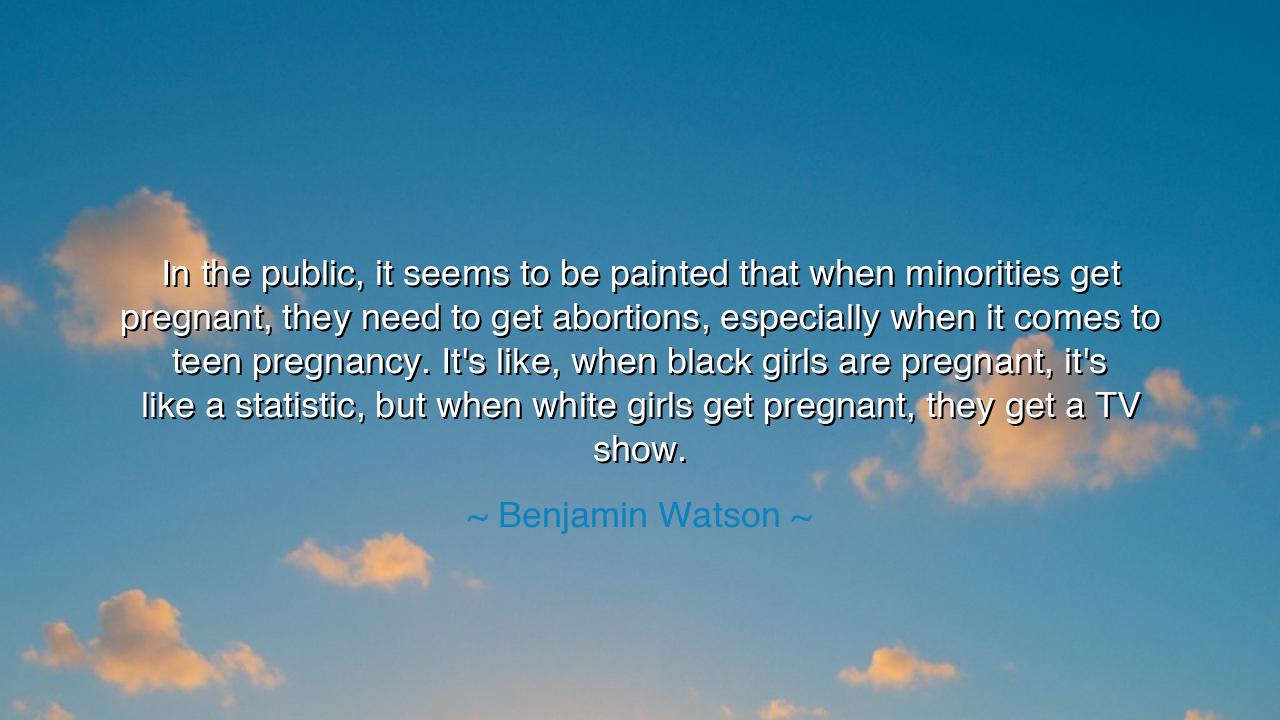
In the public, it seems to be painted that when minorities get
In the public, it seems to be painted that when minorities get pregnant, they need to get abortions, especially when it comes to teen pregnancy. It's like, when black girls are pregnant, it's like a statistic, but when white girls get pregnant, they get a TV show.






Hear the powerful words of Benjamin Watson, who declared with grief and clarity: “In the public, it seems to be painted that when minorities get pregnant, they need to get abortions, especially when it comes to teen pregnancy. It’s like, when black girls are pregnant, it’s like a statistic, but when white girls get pregnant, they get a TV show.” These words are not lightly spoken; they are an indictment of the deep inequalities in how society views human life, and a call to confront the hypocrisy of a culture that treats one group’s suffering as a spectacle while dismissing another’s as a burden.
Watson exposes a double standard, one that reveals the hidden face of systemic bias. When a black teen girl becomes pregnant, the world too often reduces her to numbers—poverty rates, dropout rates, cycles of hardship. She is stripped of individuality and cast into the role of warning, her humanity lost behind the veil of data. Yet when a white teen girl faces the same situation, her story may be elevated, dramatized, even romanticized through entertainment, as if her struggle is a stage upon which society can project fascination rather than judgment. This disparity is not only unjust, but deeply wounding, for it denies equal dignity to both.
The origin of this quote lies in Watson’s role as both athlete and advocate, speaking boldly on issues of faith, morality, and justice. As a black man in the public eye, he recognized the patterns in how culture and media frame narratives differently depending on race. His observation shines a light on the way that certain lives are treated as disposable, while others are granted the privilege of sympathy, attention, or even profit. This is not merely about television—it is about whose stories are valued, and whose are silenced.
History bears testimony to such injustices. Consider the era of the Great Depression, when poverty struck families across America. Newspapers often described poor white families as “down on their luck,” their struggles portrayed with sympathy. But poor black families were depicted as statistics of failure, their hardships attributed not to circumstance but to character. The same struggles, seen through the lens of race, produced vastly different narratives. Watson’s lament echoes this history, showing that the same unequal storytelling continues even in modern times.
The statistic is a dangerous tool when it strips away the face of the individual. Numbers can inform, but when they become the only lens through which we view human lives, compassion dies. The TV show, by contrast, can humanize—but when it is offered selectively, it becomes a mirror of privilege, extending empathy to some while withholding it from others. Watson’s contrast between the statistic and the spectacle reveals that the true battle is for recognition of equal humanity, beyond race, beyond stereotypes.
The lesson here is clear and urgent: we must tell every story with dignity. We must resist the temptation to view certain lives as burdens and others as entertainment. Practically, this means challenging media portrayals, holding institutions accountable, and in our own lives, refusing to reduce anyone to numbers or to stereotypes. It means listening to voices that are ignored, supporting communities that are stigmatized, and affirming that every child and every mother, regardless of race, deserves compassion and support.
So let Benjamin Watson’s words be carried forward as a teaching for future generations: do not let the world divide whose life matters. Confront the double standards, speak against the biases, and remember that behind every statistic is a soul, behind every story is a person, behind every pregnancy is a life worthy of dignity. Only when we honor all equally—without spectacle, without stigma—will we truly live in a society that values justice and love above prejudice and profit.






AAdministratorAdministrator
Welcome, honored guests. Please leave a comment, we will respond soon